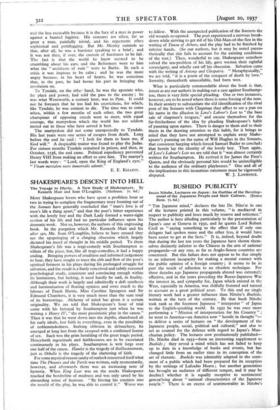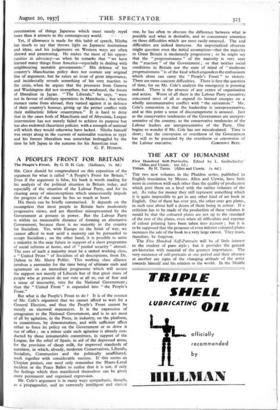BUSHIDO PUBLICITY
"THE Japanese mind," declares the late Dr. Nitobe in one of the lectures printed in this volume, " is mediaeval in respect to publicity and loses much by reserve and reticence." The author is here alluding particularly to the presentation of Japan's case at Geneva in 1932, and he quotes Lord Robert Cecil as " saying something to the effect that if only one delegate had spoken more and the other less, it would have been easier to get at the facts." It is, indeed, beyond doubt that during the last ten years the Japanese have shown them- selves distinctly inferior to the Chinese in the arts of national propaganda—at any rate, as far as Anglo-Saxon countries are concerned. But this failure does not appear to be due simply to an inherent incapacity for making a mental contact with the public opinion of a foreign country; it seems to be in part the result of adhesion to an obsolete technique. For three decades ago Japanese propaganda abroad was extremely effective, and in the years preceding the Russo-Japanese War the interest in, and sympathy for, Japan which existed in the West, especially in America, was skilfully fostered and turned to account as a great political asset. To this end no single literary work had a greater influence than Nitobe's Bushido, written at the turn of the century. By that book Nitobc took rank as the foremost Japanese " interpreter " of Japna to the English-speaking world. In 1932 he was once more performing a " Mission of interpretation for his Country " ; he went to America—an America now " hostile in thought "- to deliver a series of lectures on " the development of the Japanese people, social, political and cultural," and also to act as counsel for the defence with regard to Japan's Man- churian policy. The lectures now posthumously published— Dr. Nitobe died in 1933—form an interesting supplement to Thuhido ; they reveal a mind which has not failed to keep up to date in a knowledge of books and events, but has changed little from an earlier time in its conception of the art of rhetoric. Bushido was admirably adapted to the senti- ment of a public which had been prepared for its reception by the writings of Lafcadio Hearn ; but another generation has brought an audience of different temper, and it may be doubte i whether it is equally receptive to sentimental generalising about " national characteristics of the Japanese people." There is an excess of sentimentality in Nitobe's
presentation of things Japanese which must surely repel
more than it attracts in the contemporary world. L
Yet, if allowance is made for this habit of speech,- Nitobe has much to say that throws light on Japanese institutions and ideas, and his judgements on Western ways are often shrewd and penetrating. He makes the most of his oppor- tunities in advocacy—as when he remarks that " we have learned many things from America—especially in dealing with neighbouring unstable governments." His defence of his country's Manchurian policy does not contain any original line of argument, but he raises an issue of great importance, and incidentally reveals something of his own reaction to the crisis, when he argues that the pressures from Geneva and Washington did not strengthen, but weakened, the forces of liberalism in Japan. " The Liberals," he says, " were not in favour of military operations in Manchuria ; but when menace came from abroad, they turned against it in defence of their country's honour, giving up the pettier conflict with their militaristic fellow countrymen." It is hard to deny that in the cases both of Manchuria and of Abyssinia, League intervention has not merely failed to achieve its purpose but has also endowed chauvinist policies with a strength of national will which they would otherwise have lacked. Nitobe himself was swept along in the current of nationalist reaction in 1932 and his former liberalism was somewhat bedraggled by the time he left Japan in the autumn for his American tour.
G. F. HUDSON.







































 Previous page
Previous page